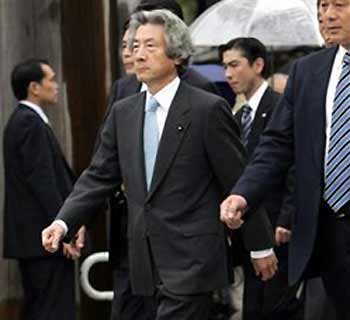|
US urge Japan to halt nuclear fuel plan
(Kyodo)
Updated: 2006-01-28 14:00
Six US Democrats have urged Japan to suspend its plan to begin a test
operation to extract plutonium at a nuclear-waste reprocessing facility in
Rokkasho, Aomori Prefecture, Democratic congressional sources said Thursday.
"We firmly believe that the continued extraction of weapons-usable plutonium
poses significant and unnecessary threats to international security and
nonproliferation," the six lawmakers said in a letter sent to Japanese
Ambassador to the US Ryozo Kato.
"To that end, we are writing to encourage you to suspend plans to conduct
active testing of Rokkasho in 2006 as part of a broader agreement to postpone
operation of the Rokkasho reprocessing plant," says the letter, obtained by
Kyodo News.
The six lawmakers include Edward Markey from Massachusetts, who has expertise
in energy policy and nuclear nonproliferation, and Donald Payne from New Jersey.
While pointing out that Japan already has a plutonium stockpile of more than
40 tons, one of the sources said the test operation at Rokkasho goes against the
trend of strengthening the global nonproliferation regimes and would have a
negative impact on Iran's nuclear designs.
The lawmakers said they made the request to Japan "as part of a global
initiative to reduce worldwide stockpiles of weapons-usable fissile materials --
highly enriched uranium and separated plutonium."
They also said the suspension "would promote nuclear disarmament and
nonproliferation, and help prevent terrorists from acquiring nuclear weapons."
Japan Nuclear Fuel Ltd., which runs the reprocessing plant in the village,
plans to start a test operation to extract plutonium by March so plutonium can
be produced as early as spring.
Emperor desirable to visit Yasukuni Shrine: Aso
Japanese Foreign Minister Taro Aso said Saturday it is desirable for the
emperor to visit Yasukuni Shrine and told China to stop complaining about Prime
Minister Junichiro Koizumi's visits to the Shinto shrine in Tokyo.

Japanese Prime
Minister Junichiro Koizumi arrives at the Yasukuni Shrine in Tokyo Monday,
Oct. 17, 2005. [AP] |
"From the viewpoint of
the spirits of the war dead, they hailed 'Banzai' for the emperor -- none of
them said long live the prime minister. A visit by the emperor would be the
best,'' Aso said in a speech in Nagoya.
The remarks by the hawkish foreign minister risk further damaging chilled
relations with China and South Korea, victims of Japanese militarism before and
during World War II who have strongly protested Japanese leaders' visits to the
shrine that honors 14 Class-A war criminals along with the war dead.
The last visit by an emperor to Yasukuni was in November 1975 by Emperor
Hirohito, posthumously known as Emperor Showa.
The Class-A war criminals, including executed Prime Minister Gen. Hideki
Tojo, were enshrined Oct. 17, 1978.
On criticism against Koizumi's visits, Aso said, "The more China voices
(opposition), the more one feels like going there. It's just like when you're
told 'Don't smoke cigarettes,' it actually makes you want to smoke. It's best
(for China) to keep quiet."
Beijing and Seoul have called off summit talks with Japan in protest against
Koizumi's most recent visit to Yasukuni on Oct. 17 last year. He has visited the
shrine once a year since taking office in 2001.
|